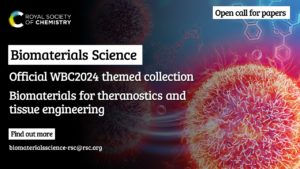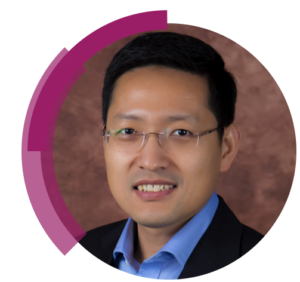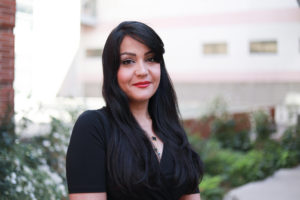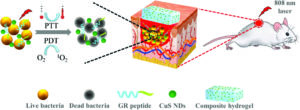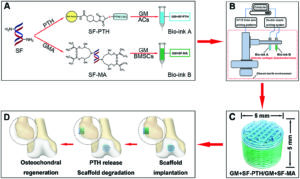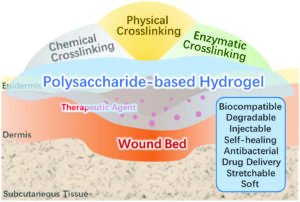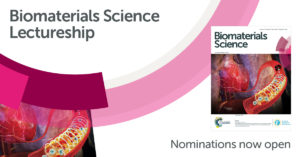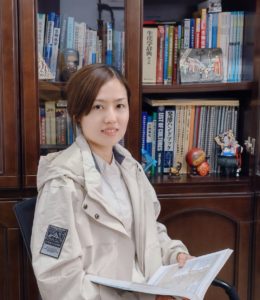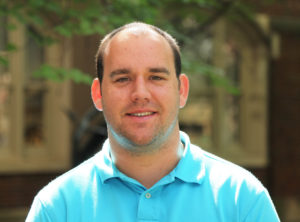It is with great pleasure that we announce Eric Appel (Stanford University) as the recipient of the 2023 Biomaterials Science lectureship.
This award, now in its tenth year, honours an early-career researcher who has made significant contribution to the biomaterials field. The recipient is selected by the Biomaterials Science Editorial Board from a list of candidates nominated by the community.

Eric A. Appel is an Associate Professor of Materials Science & Engineering at Stanford University. He received his BS in Chemistry and MS in Polymer Science from California Polytechnic State University in San Luis Obispo, CA. Eric performed his MS thesis research with Dr Jim Hedrick and Dr Robert Miller at the IBM Almaden Research Center in San Jose, CA. He then obtained his PhD in Chemistry with Prof. Oren A. Scherman at the University of Cambridge. For his PhD work, Eric was the recipient of the Jon Weaver PhD prize from the Royal Society of Chemistry and a Graduate Student Award from the Materials Research Society. Upon graduating from Cambridge, he was awarded a National Research Service Award from the NIBIB and a Wellcome Trust Postdoctoral Fellowship to work with Prof. Robert Langer at MIT. Eric’s research at Stanford focuses on the development of biomaterials that can be used as tools to better understand fundamental biological processes and to engineer advanced healthcare solutions. His research has led to more than one hundred publications and 30 patents. While at Stanford, Eric has been awarded young faculty awards from the Hellman Foundation, American Diabetes Association, American Cancer Society, and PhRMA Foundation. He also recently received the IUPAC Hanwha-TotalEnergies Young Polymer Scientist Award in 2022 and the Society for Biomaterials Young Investigator Award in 2023. He can be found on Twitter at @AppelGroup.
Read Eric’s latest article in Biomaterials Science “Subcutaneous delivery of an antibody against SARS-Cov-2 from a supramolecular hydrogel depot” and his other publications in Biomaterials Science for FREE until 30 June. These and articles from our previous lectureship winners can be found in our lectureship winners collection.
Read our interview with Eric below:
How has your research evolved from your first article to this most recent article?
My early research focused on chemical design, synthesis and characterization of supramolecular polymeric materials. My lab’s research now focuses similarly on the development of these types of materials, but we also conduct extensive translational work to leverage these materials as tools to better understand fundamental biological processes and to engineer advanced solutions to big healthcare challenges.
What excites you most about your area of research and what has been the most exciting moment of your career so far?
One thing that really excites me about our area of research is the opportunity to develop new technologies to make protein drugs better. One of the major hurdles in the development of protein-based drug products is the limited number of excipients available to solve issues with stability, biodistribution, and exposure kinetics. We hope that some of the technologies we’re building can lead to better drugs. One of the most exciting moments of my career so far has been watching my first graduate students give killer defense talks.
In your opinion, what are the most important questions to be asked/answered in your field of research?
There is so much biology yet to be understood, which is both an opportunity and a challenge for engineers. We like to have targets and solid biological hypotheses that we can engineer for, but often not quite enough is known to build the ideal therapy. But there is an opportunity to use controlled delivery technologies to ask new and/or better questions to uncover important biology. The spatiotemporal control over exposure of different molecules can help figure out where, when, how hard and for how long certain pathways should be suppressed or activated for a desirable outcome.
How do you feel about Biomaterials Science as a place to publish research on this topic?
Biomaterials Science is a terrific journal at the interface between Chemistry and Bioengineering that uniquely highlights the role of robust chemical design in creating new opportunities in biomedicine.
Which of your Biomaterials Science publications are you most proud of and why?
Our most recent Biomaterials Science publication entitled “Subcutaneous delivery of an antibody against SARS-CoV-2 from a supramolecular hydrogel depot” (Biomater. Sci., 2023, 11, 2065-2079) is one of my favorite papers reporting on a long-running project we’ve been pursuing towards improving approaches to passive immunity to infectious disease. This work was highly interdisciplinary, requiring materials development, characterization of antibody encapsulation and release (including burst release, which is a major challenge with other injectable hydrogel platforms), preclinical studies in mice, and pharmacokinetic modeling to explore the requirements for scaling potential treatments to humans.
In which upcoming conferences or events (online or in person) may our readers meet you?
I’ll be at the GRC on Polymers in June, the GRC on Biomaterials in July, the ACS Fall Meeting, and the ESB2023 meeting.
Can you share one piece of career-related advice or wisdom with early career scientists?
Work on building a solid network of mentors, both senior mentors and peer mentors (those about 2-3 years ahead of you so that they still remember well what you’re going through). This takes a lot of energy, early and often, but it is super important to build a team of trustworthy people around you to cheer you on and provide advice when needed.
How do you spend your spare time?
My wife and I have three kids and we are a pretty active bunch. We love the outdoors, including hiking and camping. Two of my favorite hobbies are skiing in the winter and mountain biking in the summer. My two boys are also very into soccer these days, and so I spend my spare time either playing soccer with them or watching them play soccer with their teams, while my daughter loves to read and wrestle.
We would like to thank everybody who nominated a candidate for the 2023 Biomaterials Science Lectureship. The Editorial Board had a very difficult task in choosing a winner from the many excellent and worthy candidates.
Please join us in congratulating Eric on winning this award!


